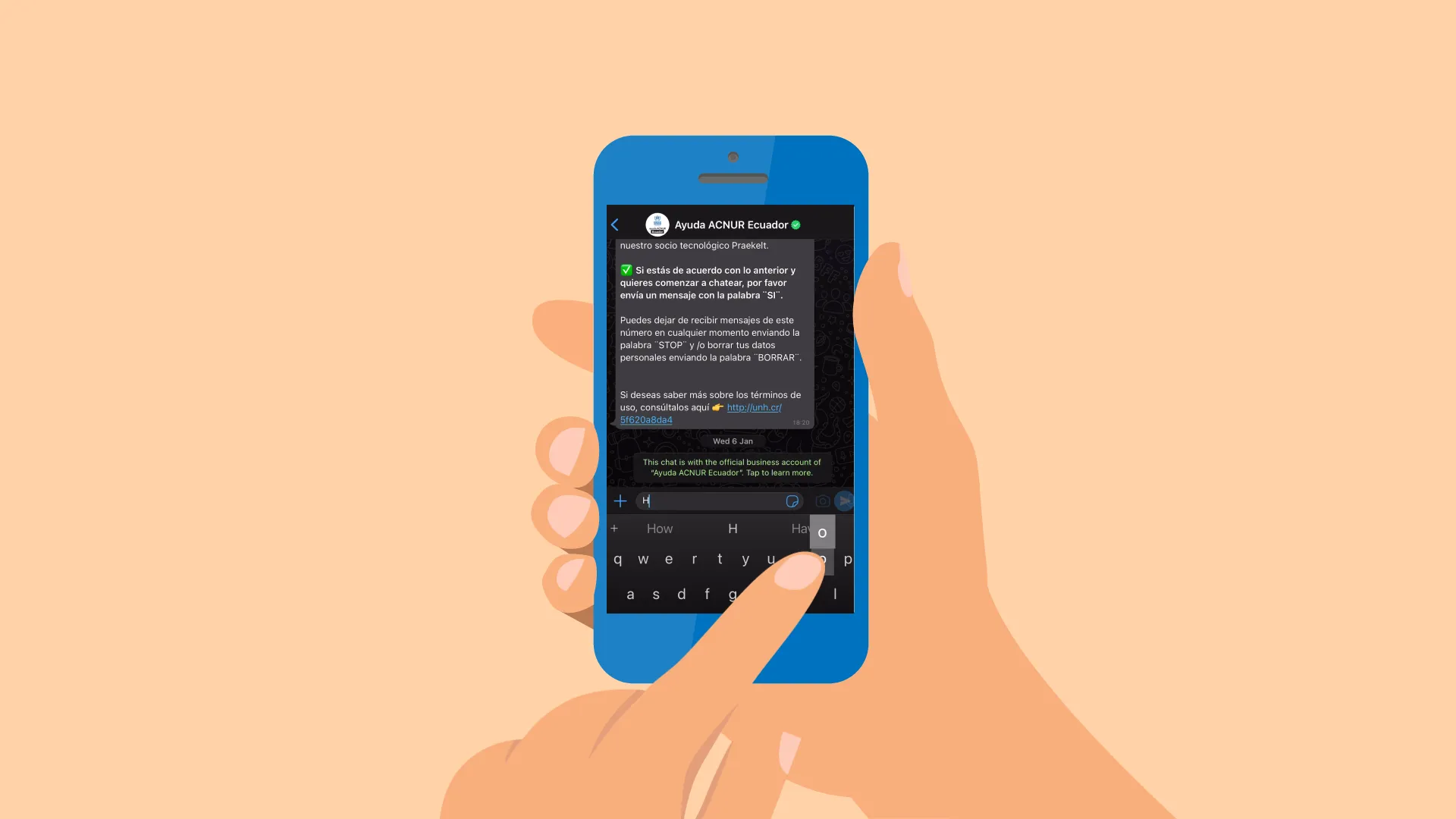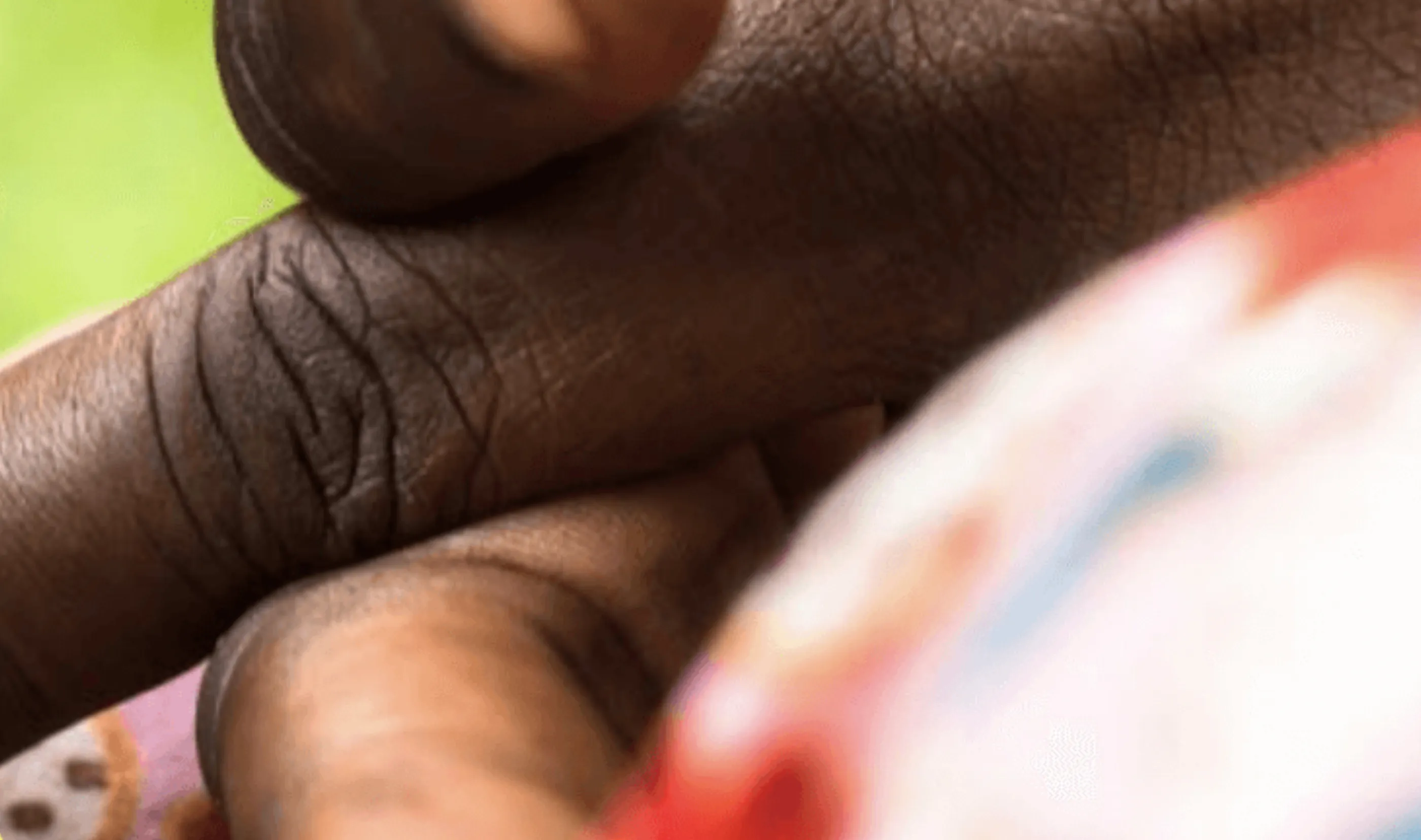
To help build a better future for refugees, UNHCR’s chat services suit their preferences, meet their needs, and safeguard their data


UNHCR, the UN Refugee Agency, is the United Nations agency mandated to aid and protect refugees, forcibly displaced communities, and stateless people, and to assist in their voluntary repatriation, local integration or resettlement to a third country. Through its commitment to putting people at the center of its humanitarian response, UNHCR saves lives, protects rights, and builds a better future for those it assists.
Impact in numbers
20
75K+
17
“If you are serious and realistic about the resources it will take to get a good service working, if you spend the time you need to work out what you want to say and provide, and if you engage communities end-to-end I’d say you have the nuts and bolts of a successful messaging service in your hands.”
John Warnes, Deputy Head of Innovation (acting), UNHCR
One organization. 20 chat lines, 60 000+ users - and building
- Currently the UNHCR has a total of 20 WhatsApp lines
- A total of 12 different languages are used across them - English, Spanish, Arabic, Persian, Haitian, French, Hungarian, Russian, Ukrainian, Farsi, Somali and Tigrinya.
- Since the pilot, lines have been built to serve communities in Brazil, Panama, Costa Rica, Ecuador, Guatemala, El Salvador, Greece, Mexico, Peru, Algeria, Chile, Hungary, Indonesia, Jordan, Sudan, Poland and Hungary.
- OA variety of use cases were tried, such as sharing life-saving information with communities, supporting registration activities and coordination of inter-agency services available.
- Over 75 000 users
Driven by commitment to digital inclusion for all and spurred by covid
UNHCR’s Digital Innovation programme aims to ensure that refugees and the communities that host them have the right, and the choice, to be included in a connected society, and can have their voices heard in the design and implementation of humanitarian response. As part of its Accountability to Affected People (AAP) commitments, UNHCR must strengthen the digital dimension of its interaction with the people it serves.Although the Innovation Team had been working on digital inclusion for several years before the pandemic, COVID-19 was an impetus for change. Physical distancing measures ushered an accelerated transition towards digital communication channels. These have also come at a time when the communities served by UNHCR are more connected than ever and are frequently seeking engagement with the organization in a way that fits in with the lives they are building.The chatbot now enhances the UNHCR’s overall work, which includes significant human assisted dimensions.
Why WhatsApp?
- WhatsApp is continually articulated as a top channel to use by the communities served by the UNHCR and the organization wanted to work with communities’ preferred and trusted communications channels.
- It allows the organization to meet people “where they are” in an online space and provides a timely response to the most frequently asked questions related to asylum, access to rights and services for the people UNHCR serves.
- It provides opportunity to strike the right balance between engaging with communities where they are online, and the need to put robust measures in place to emphasize consent, users’ privacy, and data rights as part of UNHCR’s comprehensive Data Protection Policy that guides teams in developing solutions that protect the personal data of persons of concern (PoC).
- There is an opportunity for enhancing inclusivity using multimedia and other elements, like audio files.
- The ability to provide information in multiple languages.
- Risk is more than data protection issues, it’s also about credible, fact-based information sources, and using WhatsApp enables UNHCR to deal with it on a broader scale, including verifying (through elements like the blue tick) its lines.
- With a focus on non-profit organizations, a track record of strong community engagement, UNHCR believed that working with Turn.io provided greater flexibility and helped the agency implement a “privacy by design” setup. The manner in which Turn.io approached humanitarian endeavors and the flexibility of its solution helped us build out the features we needed from a data protection standpoint.
“This tool is a system to strengthen communication with refugee populations in Ecuador. The main objective is that refugee persons can access vital, updated verified information to know that they can trust this information to know their rights in the country and how they can contact UNHCR and partners, how to apply for asylum as well as a variety of content.”
Diego Niardi, Inter-Agency Coordination Officer.
From a pilot to multiple country service lines
Working with Turn.io and using WhatsApp’s Business API, a pilot for two way communication with forcibly displaced people was initiated. The first iteration supported relationship management with communities by providing automated responses and valid, accurate and credible information.
For UNHCR it was vital to devise a mechanism to facilitate informed decision-making by users when it comes to understanding and accepting the terms and conditions of the service. To ensure better compliance with the organization's Data Protection Policy regarding informed consent, an initial message was configured for first-time users. This message provides a brief overview of what data is collected, who has access to it, for that purpose and what rights users have over it.
Through triaging of requests and messages this was later augmented by adding human assisted responses and elements such as audio files for visually impaired individuals or for those who have literacy challenges.
At present, individuals can seek answers to common questions about their rights and the services available to them (provision of office locations, advice on asylum procedures, access to services from partner organizations). They can also be referred quickly to UNHCR staff when they need specific support - for example to report an incident of violence or abuse.
User testing and contextualizing each service individually
Key to the WhatsApp services is contextualizing the service to each country where UNHCR is supporting communities - and working with them through user testing to see how they adapt and respond to the service and then make changes where required.
“We are not a top down organization - and in fact are quite federated. We do not have a global set of content to push down to each country and then push out through our lines. The need of each community determines the service built. But this doesn’t mean that we start from scratch because our staff in different countries have already worked through a lot of the information they are providing to communities and have prepared it for different platforms - the main one being https://help.unhcr.org/.” John Warnes.
Contextualisation has resulted in different features and functions. For instance:
- Ecuador converted all the text based messages to audio. This was to ensure access for the visually impaired as well as those in the user community who might have literacy challenges.
- In different cultures, user feedback was important in deciding on certain features and functions. In LATAM, voice and audio notes are commonly used and so these were included in the service.
Surprising findings along the way …
A surprising finding of UNHCR research into the chat services was how important such work has been for the staff in the country operations. Maintaining proximity through digital channels had a positive impact on staff satisfaction in their functions.
… and confirming that investments in solutions like these have positive impact in the protection, assistance and empowerment of the people serves
The service lines show time and time again an ability to lift an important amount of workload for colleagues in the field, thereby allowing them to allocate their efforts and resources in other strategic priorities. For example, protection officers in the Ecuador operation have reportedly saved one hour to an hour and a half of time a day due to reduction in time expenditure required to answer info requests.
However, this is not a ‘quick win’ in order to save time. The teams needed to invest more time and effort in not only creating an adequate service that meets the needs of users (with extensive user testing etc.) but also answering people’s questions and knowing how to refer any issues or concerns that require follow-up from specialized staff. It creates space for teams to think more strategically about interventions rather than ‘firefighting’, which can spark new and innovative approaches to staff members’ work.
Read more about UNHCR’s key findings in this blogpost - https://medium.com/unhcr-innovation-service/six-key-findings-from-engaging-communities-through-messaging-apps-95a9291818f7
Measuring success through creating a meaningful service
The success of the UNHCR service lines are determined around whether they create meaningful exchanges led by communities that, over time, contribute to building trust.
“We have certain things that we want to get across as an organization,but the main criteria of success comes through knowing that our community is satisfied and is actually using the service. In this, community feedback is critical.” John Warnes
“I’m a WhatsApp fan. This channel that UNHCR has made available is very important as it allows us to have direct communication and I think that was missin.”
Azalea, 72, forcibly displaced person from Venezuela in Brazil.
Insights
Insights for humanitarian organizations looking to use Chat
- Invest time & resources - Don’t necessarily approach setting up a WhatsApp line through the angle of saving time and money. If you invest time and resources, namely human ones, at the beginning to build an effective and meaningful service, saving both of these will come as a by-product.
- Importance of validation of the tool with community members to ensure content is relevant and the tool is user-friendly
- Not on the side - Digital channels should not be considered peripheral for organizations to engage communities meaningfully, but rather considered as part of a strategic and systematic approach and integrated into broader engagement efforts.
- Omnichannel approaches are key - Using several different communication channels to give users choice is important as diverse communities increasingly wish to use a variety of channels to access information and engage with organizations.
- Human assisted responses make a difference - Human assisted
- Constantly evolving needs - In fast evolving contexts, such as humanitarian responses, it is paramount to ensure a mechanism is in place to monitor the usage of the solution and ensure content is up to date. Moreover, direct feedback from users is actively sought on the solution and content available to ensure necessary adjustments are carried out to maintain the relevance of the channel.
- Users' data rights matter - In line with the growing interest to protect the personal data of vulnerable populations, it is essential to design a solution that takes this into consideration. Options like a welcome message that briefly explains what data is collected, who has access to it and the rights that users have over it should be considered.
Turn.io features used:
Automation
Bulk Messaging
Helpdesk




